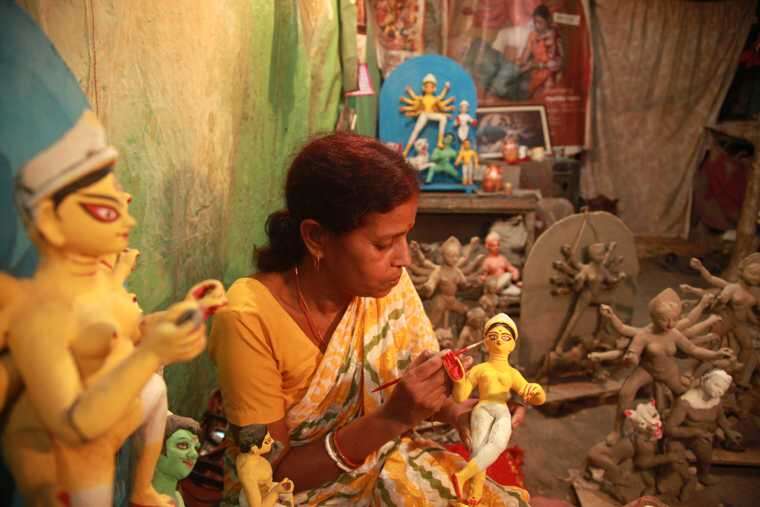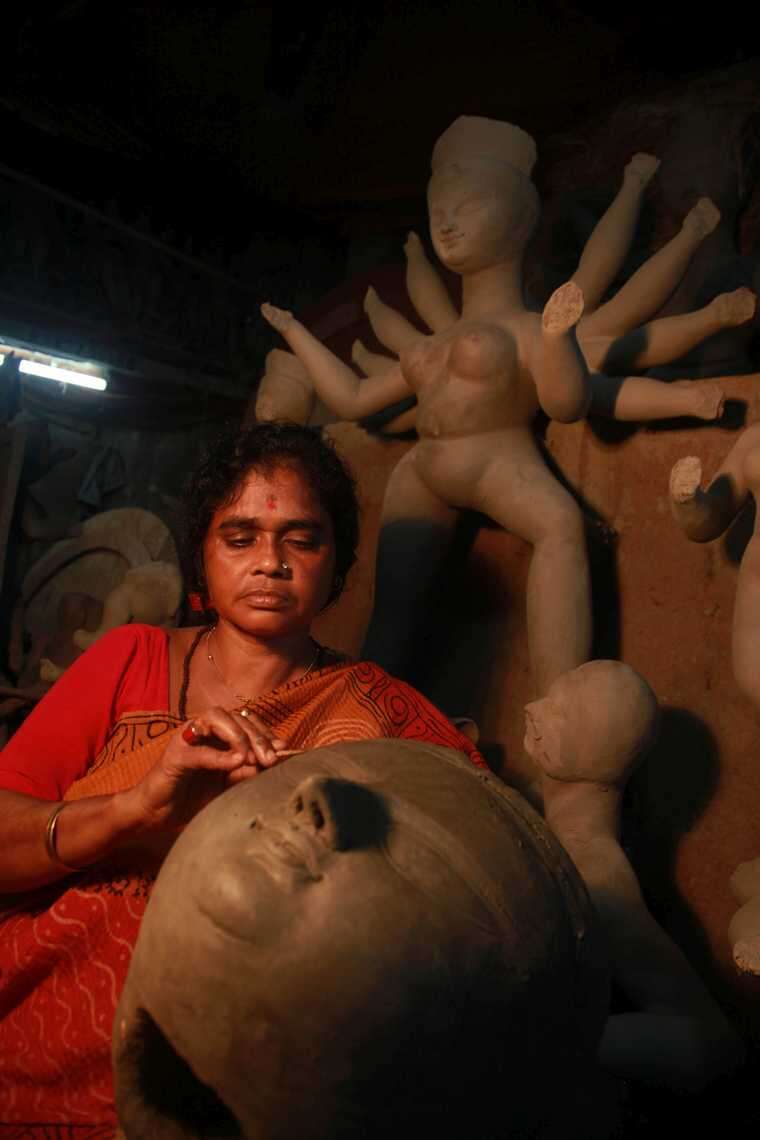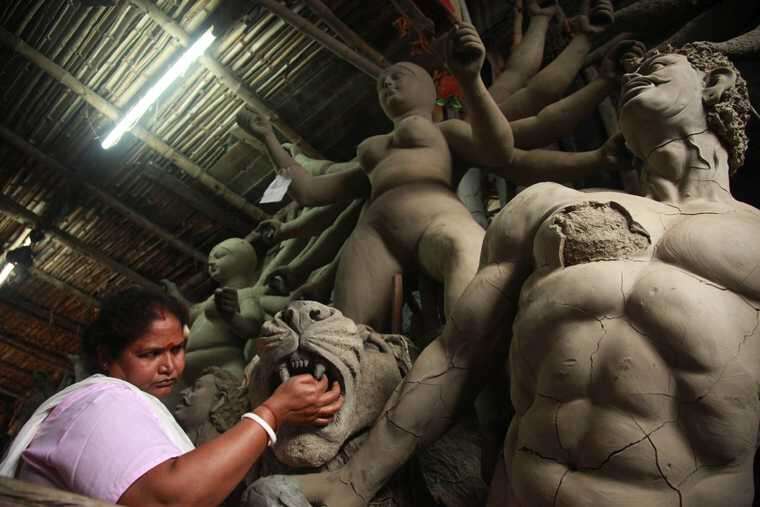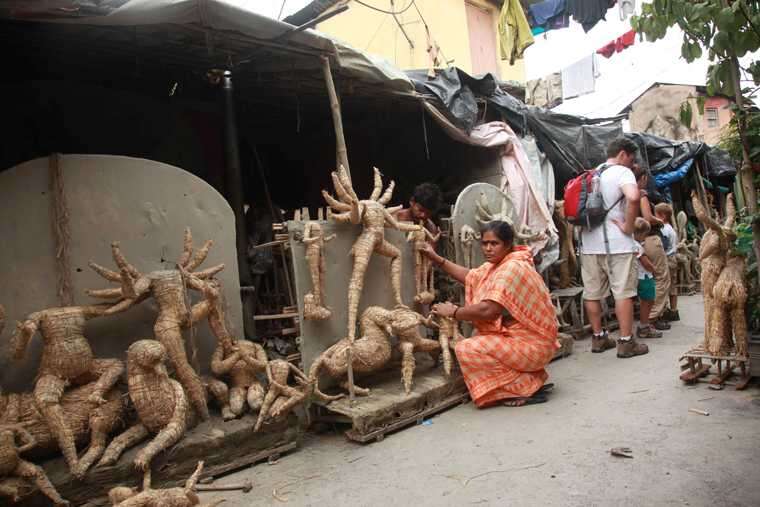
Here's how Kumortuli women artisans survive in a man's world
It’s a man’s world out there in Kolkata’s celebrated potters’ hub, Kumortuli. Yet a handful of women have been challenging this ancient monopoly. A rare breed of women artisans are breathing life into wet clay to create a goddess they call their own, a warrior woman who is their mascot. Here are the most celebrated ones:
MALA PAL
Mala Pal is a multi-tasker, making idols at breakneck speed to meet Durga puja demands, supervising her labourers, obliging photographers and tourists, and looking after her ailing mother who lives in a cramped room behind her studio in the potters' hub. Mala, who has won several state awards for her craftsmanship, specialises in miniature, ‘foldable’ Durga idols that are exported to Europe, Australia and Canada where pujos are organised by the Bengali diaspora. The diminutive 41-year-old took over the reins of making idols in Kumortuli when her father died in 1985. With almost no help from her elder brothers, who gave up the family enterprise, Mala has been single-handedly running her studio over the past three decades. She quit school at the age of 15. “I have gone through a lot of financial hardship, but now I have received some recognition and the business has been profitable,” says Mala. “But even now some male colleagues tell people, ‘She is a woman, how can she handle big pujo orders?’”

CHINA PAL
China is a self-confessed workaholic. And she refuses to talk about her personal life. “I am known by my work, so let’s just focus on my profession,” cautions the celebrated Kumortuli artisan before her interview with us. China was just a teenager studying at Baghbazar’s Nivedita School for Girls when her father, Hemanta Pal, died in 1994. Hemanta was a renowned idol-maker in Kumartuli. After his death, China, the youngest of six siblings, started shouldering the responsibility of managing her father’s studio. Her father never really wanted his daughters to work in Kumortuli. But in the last few years before his death, he started training his youngest daughter. Her two elder brothers were not keen on running the family business and settled for less strenuous jobs. “Ours is a harsh business. Everything is time-bound and you have to deliver your products on time because pujo is organised on certain fixed days in a year,” explains China, who is in her late 30s and runs a team of 12.

KANCHI PAL
As we enter Kanchi’s spacious workshop in Kumortuli, we spot a large group of women accompanied by a couple of off-duty policemen from the local thana trying to drive a hard bargain. The women are from the police residential quarters nearby and they have come to Kanchi to buy a Durga idol. They want her to slash her prices for them. Kanchi is in no mood to bow down to their demand. However, with a little push from bodo babu (head of the local thana), Kanchi settles for a discount of `10,000. Needless to say, Kanchi is one of the most sought-after new generation artists in Kumortuli, giving her male counterparts stiff competition. She learnt the craft from her mother, Archana Pal, and took over the business when her father, Nrisimha Pal, died about seven years ago. She is a one-woman army—crafting the idols, supervising her labourers, and taking care of finance and the business aspects. “There is no difference between a male and a female idol-maker,” stresses Kanchi, whose husband works in Kuwait.

KAKOLI PAL
Unlike Mala, China or Kanchi, Kakoli Pal doesn’t have a dedicated studio. She sculpts the idols on a narrow Kumortuli lane, lined with shanties, public toilets and studios belonging to male artisans. She has repeatedly appealed to the authorities to provide her with a studio to rent, to no avail. She has also given up on getting any form of financial help from the state government. She went through financial hell when her husband, a Kumortuli artisan himself, died of a brain stroke about 12 years ago. Her eldest daughter was seven years old at that time, and her youngest, barely a few months. She hails from Krishnanagar in Bengal’s Nadia district. She had no formal training in idol-making—she was just married off to a Kumortuli artisan. She makes around 25 idols a year, mostly for household pujos. But her struggle hasn’t ended, as the market is fiercely competitive and there are some constraints for women artisans. “I cannot go to remote places to source materials due to safety issues. My workers get poached, so I find it hard to grow my business the way I want to,” she rues.